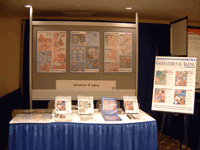 This year's Canadian Association of Gerontology meeting (October 24-26) offered over 300 presentations--including plenary sessions, concurrent sessions, poster presentations and workshops--that embraced the theme "Aging and Society: Taking Charge of the Future". Hosted at the Hotel Bonaventure Hilton in Montreal, QC., opening ceremonies set the tone for the conference with a keynote session by Dr. Xavier Gaullier, an expert in the study of "managing ages" in the workplace and in society.
This year's Canadian Association of Gerontology meeting (October 24-26) offered over 300 presentations--including plenary sessions, concurrent sessions, poster presentations and workshops--that embraced the theme "Aging and Society: Taking Charge of the Future". Hosted at the Hotel Bonaventure Hilton in Montreal, QC., opening ceremonies set the tone for the conference with a keynote session by Dr. Xavier Gaullier, an expert in the study of "managing ages" in the workplace and in society.
Symposia focusing on integrated service delivery networks for the frail elderly followed, with speakers including Dr. Pierre Durand, a geriatrician and community health specialist from Laval University, and Dr. Michel Tousignant from the Institut Universitaire de Geriatrie de Sherbrooke. Concurrently, paper sessions covered themes ranging from issues in long-term care facilities and psychosocial aspects of health to assessment issues in dementia. The day concluded with symposia on the challenge of mild cognitive disorders as well as a roundtable discussion on the challenges of aging communities and their effects on seniors' services.
Dr. Thomas Perls, an associate professor in medicine at Boston University School of Medicine and a geriatrician at the Boston Medical Center, introduced the second day of the CAG meeting with a review of the New England Centenarian Study, which he has directed for the past eight years. The study has documented that centenarians have a history of aging relatively slowly and have either markedly delayed or are entirely free of diseases normally associated with aging, such as Alzheimer disease, cancer, stroke and heart disease. Morning sessions followed with a focus on resilience and adaptation in later life, with many appearances of Dr. Norm O'Rourke from the Gerontology Research Centre at Simon Fraser University, as well as many presentations addressing addictions, abuse, neglect and mistreatment.
Ideas on how to improve the care of seniors in the emergency department were presented at the same time as a nutrition symposium, at which the prevention of weight loss in dementia patients was discussed as well as interventions to promote health and quality of life of vulnerable seniors. Finally, a workshop on assisting the visually challenged elderly and a roundtable discussion on lifelong learning in older adults helped conclude the CAG's goal of creating a better old age for all.
Geriatrics & Aging followed this year's CAG events in Montreal and would like to thank all those who visited our exhibit and who offered their support and encouragement for our ongoing efforts at providing continuing medical education for primary care practitioners specializing in geriatrics.
Geriatrics & Aging extends their gratitude to the many attendees who visited our exhibit at this year's Annual Scientific and Educational Meeting of the Canadian Association on Gerontology.

 This year's Canadian Association of Gerontology meeting (October 24-26) offered over 300 presentations--including plenary sessions, concurrent sessions, poster presentations and workshops--that embraced the theme "Aging and Society: Taking Charge of the Future". Hosted at the Hotel Bonaventure Hilton in Montreal, QC., opening ceremonies set the tone for the conference with a keynote session by Dr. Xavier Gaullier, an expert in the study of "managing ages" in the workplace and in society.
This year's Canadian Association of Gerontology meeting (October 24-26) offered over 300 presentations--including plenary sessions, concurrent sessions, poster presentations and workshops--that embraced the theme "Aging and Society: Taking Charge of the Future". Hosted at the Hotel Bonaventure Hilton in Montreal, QC., opening ceremonies set the tone for the conference with a keynote session by Dr. Xavier Gaullier, an expert in the study of "managing ages" in the workplace and in society.